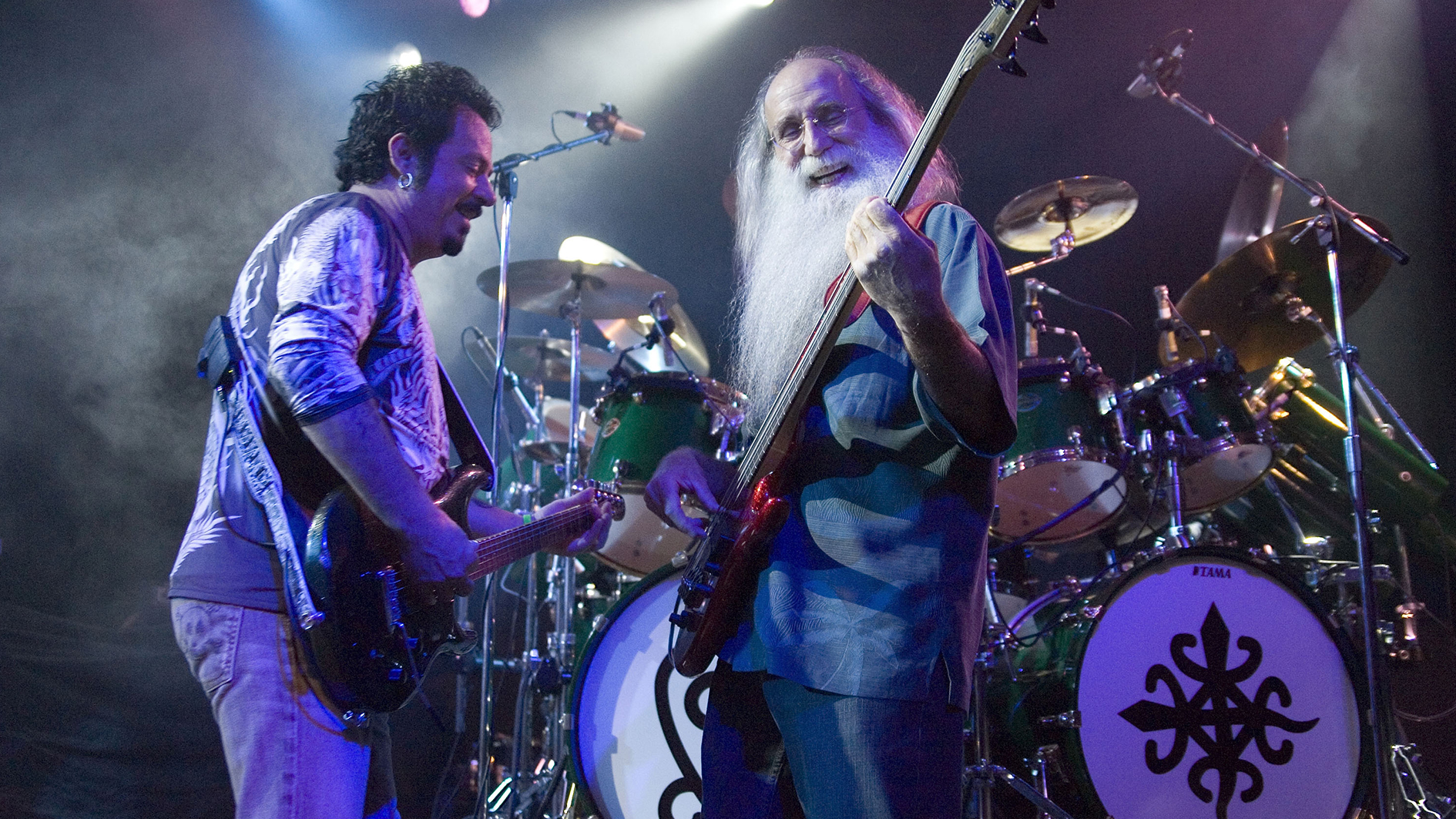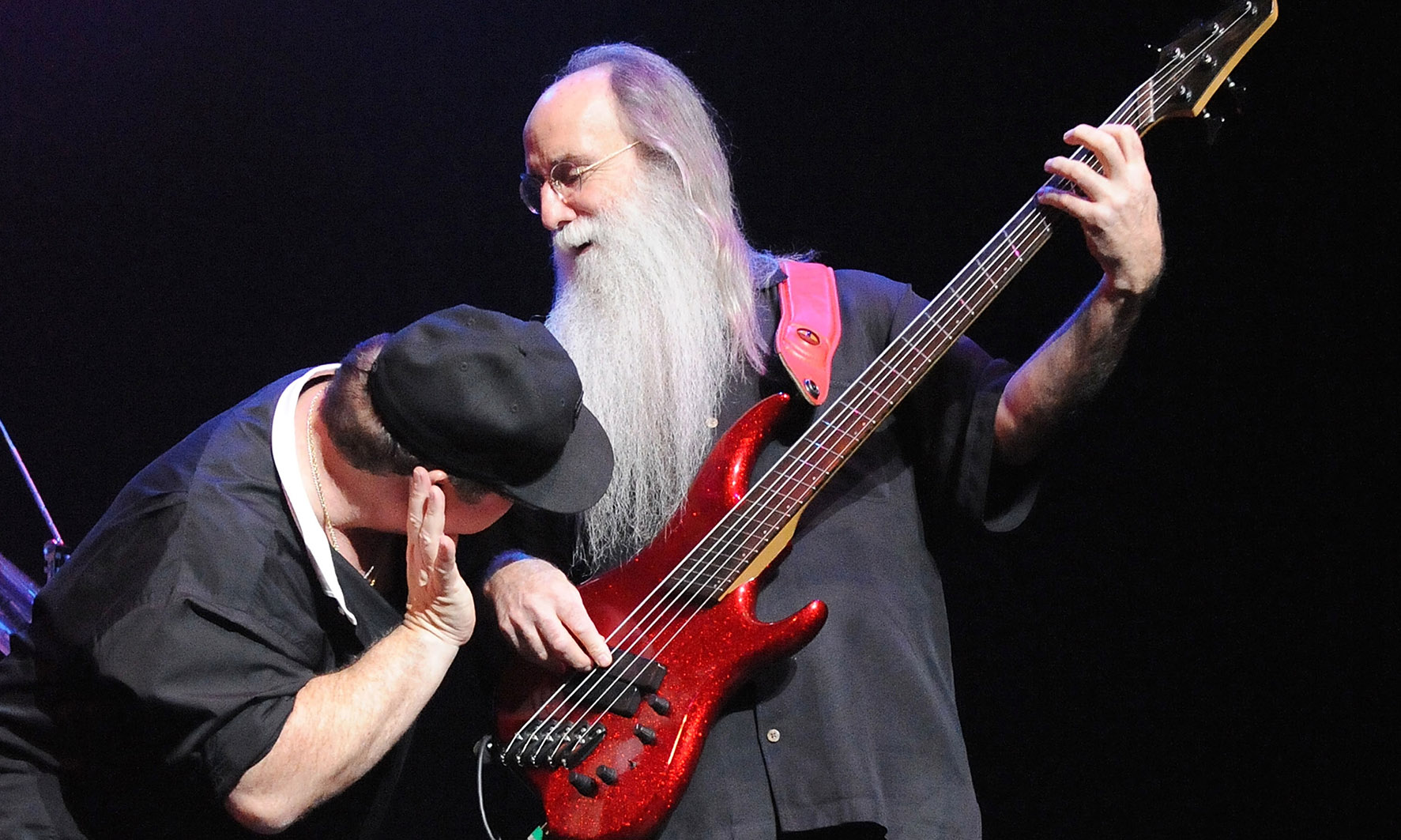Session bass legend Lee Sklar talks fan frets, beard maintenance and touring every year since 1970 in this classic interview
"I’ve been on the road for 42 years and I’ve only broken two strings - and I play really hard!"

You’ve heard Lee Sklar’s bass parts more often than you think. His work appears on a huge number of albums in a wide variety of musical genres, and although his best-known playing has been alongside James Taylor and Phil Collins, the cult of Sklar extends into pretty much every area of recorded endeavor, from film to stage to stadium and beyond.
When we met Lee he was recovering from an unexplained infection - possibly the result of a spider bite sustained while doing some yard work, he thinks - that left him with a baseball-sized swelling on his arm and a raging temperature. Thankfully his playing won’t be affected - “although that’s subjective!” as he notes.
Let’s get one crucial issue out of the way first. Why that planet-sized beard, Lee? “I went to a high school where there were all sorts of rules,” he sighs, “and I got so sick of having to look a certain way and keep my hair trimmed to their regulations that the day I left - the second I left! - I started growing my beard. I’ve never really cut it since then, although I do trim it from time to time.”
Despite this relaxed approach towards his facial furniture, Sklar has been fueled for the last 40-plus years by a work ethic that has rarely involved a break - or, he tells us, even the mildest of rock ’n’ roll indulgences.
“I saw too many people fall victim to booze and drugs,” he tells us, “and so I’ve never done anything like that myself.” What, no vat of whiskey before the show like real rockers do? “No - nothing!”
Perhaps this should come as no surprise. Sklar first emerged onto the music scene in an era where music was mellow and the vibes cool - or at least, that was the message of acoustic troubadour James Taylor, with whom Sklar recorded a fistful of LPs in the golden age of the singer-songwriter.
From 1971’s Mud Slide Slim And The Blue Horizon to ’88’s Never Die Young, Taylor’s sweet fingerstyle and Sklar’s adept, winding bass-lines were the toast of the American airwaves, largely because our man was a master of adapting his bass parts to the subtle dynamics of Taylor’s songwriting.
Get The Pick Newsletter
All the latest guitar news, interviews, lessons, reviews, deals and more, direct to your inbox!
The partnership was renewed last year when Sklar rejoined Taylor and his old sparring partner Carole King for the giant Troubadour Reunion Tour, a jaunt which took the band through America’s biggest venues and which was chronicled this year on DVD.
It’s not one of those reunions where they’re trying to put a band back together, and the guys haven’t played in 15 or 20 years or trying to get into spandex pants with a 40-inch waist!
“It was really great,” says Sklar, asked if he enjoyed the Taylor/King reunion. “It was a huge tour through massive venues - we did three nights in the round at Madison Square Garden. There is an old saying that you can’t go home, but we actually got to go home, and it was great.
"It was so strange to be on stage and look around and see the exact same band that we’d had in 1970, and the thing that was great is that everybody is still working and so they’re still at the top of their game. It’s not like one of those reunions where they’re trying to put a band back together, and the guys haven’t played in 15 or 20 years. They’re trying to get into spandex pants with a 40-inch waist!”
However, Sklar didn’t rest on his laurels, hitting the road immediately after the Troubadour Reunion tour with country star and sometime Mr Julia Roberts, Lyle Lovett. “The week afterwards I went out on tour with Lyle,” recalls Sklar. “I started boning up on the songs towards the end of the James and Carol tour.
"I’m doing that this time, too, because I’m going out with Lyle from July to September, and I have to relearn the Toto set at the same time because I’m going out with them in October.”

While this amount of back-to-back touring might seem exhausting at best and impossible to execute at worst (how does he remember all those songs?), it’s exactly how Sklar has paid the bills since the Woodstock era.
“I’ve toured every year since 1970, plus sessions,” he nods. “I’ve been lucky, that’s the way I see it. I pinch myself every day. It’s a gift. I’ll never get sick of life on tour, although I do get tired of certain aspects of it: you get tired of airports and sitting in buses for eight hours. That all disappears the minute you walk out on stage, though, so to me the balance is far more in favor of pleasure. Every job has crappy parts!”
You may have seen ads for Sklar’s signature Dingwall bass, a tasty beast that will either enthrall or terrify you depending on your fondness for the Ralph Novak fan-fretting system that it employs.
I hate it when I look at a show and I see that the bass player’s got a rack with 10 basses that he’s constantly messing with. I’m like, ‘Man, just play the bass!’
“I met Sheldon Dingwall at NAMM 14 years ago,” Sklar remembers. “He walked up to me and asked if I wanted to try one of his basses. I normally don’t bother with that kind of thing because I’m pretty happy with my old stuff, but I looked at the fan-fretting and said ‘Explain this to me’. So he told me the whole concept behind it.
"I played it, and one of the issues that I have is that a tremendous amount of my recording work is replacing programmed synth-bass parts. Now, inevitably when guys are recording synth-bass they love to go down into reaches that usually don’t read well, so when I tried this bass, suddenly I had a 37” B string, and the bottom end was clear and punchy.
"I said, ‘This is for me’ and it’s become my main touring bass, because if there’s one song in the show that requires five-string, I’ll play five-string for the whole show. I hate it when I look at a show and I see that the bass player’s got a rack with 10 basses and he’s constantly messing around with them. I’m like, ‘Man, just play the bass!’”
As for the fan-fretting, which spooks some players so much that they literally can’t bring themselves to look at it, Sklar laughs and says: “Some guys hate it, they psych themselves out of it. I had a friend who came by the house and played it before he looked at it, and he loved it. Then he looked at the frets and he couldn’t play it any more!

"Personally, I got used to playing it in about five seconds. If you look at the angle, especially at the bottom end, it lines up ergonomically with your wrist joint. It’s actually very comfortable.
"The only time it gets a little bit squirly is when you get up to the last six frets of the neck, because if you look down at the dot marker on the upper side of the fretboard, the note you’re going to finger is about a half-inch away from that. Guys ask me if that’s a problem, and I tell them ‘Only if you look at the dot!’”
He continues: “I’m involved with Warwick too, and we’re building one of their Star Basses - the ones that look like an old Framus, with F holes. We’re doing a double-neck with a fretted five-string and a fretless four. I’m really excited, because I’ve had a couple of double-necks over the years and they’ve never been that good.
You don’t finger a fretless the same way you finger a fretted, but if you see the indicators you go into fretted mode and you’re always out of tune
"It’s going to have one jack socket and a single toggle switch which allows me to have either neck on, or both. That way I can hit a low E on the fretted neck, for example, and let it ring while I play some fretless parts.”
Asked if he finds fretless as satisfying to play as fretted, Sklar explains: “I played one of their fretless Star Basses and it was funny - I’m one of those guys whose intonation is terrible if there are fret markers on the fretboard, but if it’s a pure black fretless fingerboard I’m fine! You don’t finger a fretless the same way you finger a fretted, but if you see the indicators you go into fretted mode and you’re always out of tune.”
In line with his preference to play a single bass through a given show, Sklar utilizes a powerful but stripped-down rig. “I work with Euphonic Audio in New Jersey, who I discovered - once again - at a NAMM show a few years ago,” he explains. “For simplicity, I use their NL410 and a 1000W Pro head. I like things simple.”
This philosophy extends to a healthy disrespect for gear obsessives, his comments above about his equipment notwithstanding.
“I’m not a gear guy, I don’t give a damn,” Sklar declares. “I’ve never even counted the frets on any of my basses. People ask ‘How many frets do you have?’ and I say ‘Enough!’ I honestly don’t care.
“I’ll fly in and do a gig and use whatever bass they say they have. I’m not one of these guys who’s completely dedicated to his rig and his gear. If I have the opportunity to choose the gear I use then I’ll take it, but I’m not completely hung up on that stuff.”
Sklar recalls the path that led him to become a bass player, and unsurprisingly - given his laissez-faire attitude to gear - it didn’t involve any high-quality instruments until some years into his playing career.
He tells us: “When I was four or five years old I took piano lessons, and I became something of a child prodigy - I was a classical snob and a real asshole!
I went through a series of basses until I finally got a 1962 Jazz for 90 bucks. That’s when I knew I’d come home, with that Jazz. It all made sense with that bass
“But when I went to junior high at 12 years old, the music teacher told me that there were 50 kids who played piano, and that he would give me lessons on string bass if I wanted. So he pulled out this old, blonde upright and showed me a few things, and within a week I was in love with it. I loved the vibration of it and the responsibility that the instrument has.
“Then when the Beatles hit, boom – my life changed. My dad bought me a Melody bass guitar, because no-one could hear the upright bass in those days, and I went through a series of basses until I finally got a 1962 Jazz for 90 bucks. That’s when I knew I’d come home, with that Jazz. It all made sense with that bass.”

Nowadays the world and its sales rep wants Sklar to endorse their products, and it’s a situation that makes him a little uneasy.
“I get that all the time,” he admits, “and some of it makes me really uncomfortable – because sometimes the gear really isn’t that good, and it’s hard to say ‘this sucks’ to somebody who’s really devoted their lives to it.”
Fortunately, tried and trusted equipment keeps Sklar on the road and performing at his best.
“I used to take my old basses out on tour,” he muses, “but I’ve stopped bringing them out because I don’t trust airlines and sometimes stage crews, who may be locals or whatever. Stuff happens! I’d rather just play a five-string, and I take two Dingwalls so I’ve got one as a backup.
“Knock on wood, I’ve been on the road for 42 years and I’ve only broken two strings – and I play really hard!” Two strings in four decades? No wonder he’s so busy…
Bass Player is the world’s most comprehensive, trusted and insightful bass publication for passionate bassists and active musicians of all ages. Whatever your ability, BP has the interviews, reviews and lessons that will make you a better bass player. We go behind the scenes with bass manufacturers, ask a stellar crew of bass players for their advice, and bring you insights into pretty much every style of bass playing that exists, from reggae to jazz to metal and beyond. The gear we review ranges from the affordable to the upmarket and we maximise the opportunity to evolve our playing with the best teachers on the planet.
“I asked him to get me four bass strings because I only had a $29 guitar from Sears”: Bootsy Collins is one of the all-time bass greats, but he started out on guitar. Here’s the sole reason why he switched
“I got that bass for $50 off this coke dealer. I don’t know what Jaco did to it, but he totally messed up the insides!” How Cro-Mags’ Harley Flanagan went from buying a Jaco Pastorius bass on the street to fronting one of hardcore’s most influential bands











